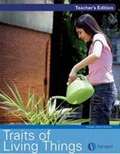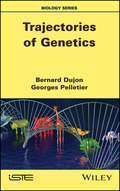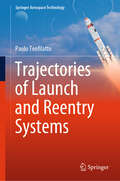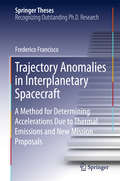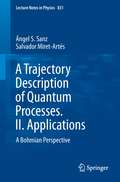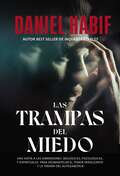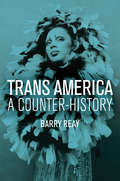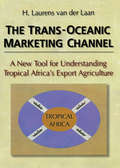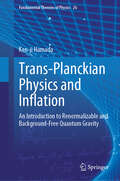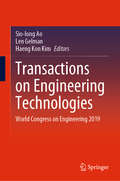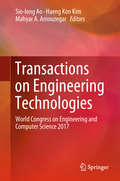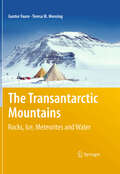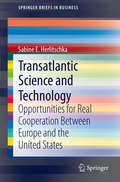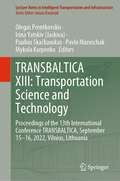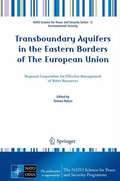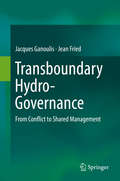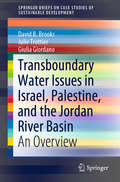- Table View
- List View
Trait-Mediated Indirect Interactions
by Takayuki Ohgushi Oswald J. Schmitz Robert D. HoltThere is increasing evidence that the structure and functioning of ecological communities and ecosystems are strongly influenced by flexible traits of individuals within species. A deep understanding of how trait flexibility alters direct and indirect species interactions is crucial for addressing key issues in basic and applied ecology. This book provides an integrated perspective on the ecological and evolutionary consequences of interactions mediated by flexible species traits across a wide range of systems. It is the first volume synthesizing the rapidly expanding research field of trait-mediated indirect effects and highlights how the conceptual framework of these effects can aid the understanding of evolutionary processes, population dynamics, community structure and stability, and ecosystem function. It not only brings out the importance of this emerging field for basic ecological questions, but also explores the implications of trait-mediated interactions for the conservation of biodiversity and the response of ecosystems to anthropogenic environmental changes.
Traits and Reproduction: The Genetics of Spider Silk, Investigation Notebook with Article Compilation [Grade 6]
by The Lawrence Hall of ScienceNIMAC-sourced textbook
Traits and Reproduction: The Genetics of Spider Silk, Investigation Notebook with Article Compilation
by The Lawrence Hall of ScienceNIMAC-sourced textbook
Traits of Living Things, My Science Notebook
by Sangari Research Development CenterNIMAC-sourced textbook
Trajectories of Genetics
by Bernard Dujon Georges PelletierAs genetics becomes increasingly important in our everyday environment, misinterpretation of its scientific foundation leads to mixed feelings of hope and fear about the potential of its applications. Trajectories of Genetics uncovers the many facets of genetics - from humans to animals, plants, and the microscopic world through more than a century of scientific progress. It summarizes the evolution of ideas as the organization and functioning of genetic material has become clearer. The book analyzes how genetic information – transmitted from generation to generation in nucleic acids – enables the fulfillment of biological functions and the evolution of the living world. It illustrates current developments in many areas: the improvement of species of agronomic interest, an increased understanding of microbial worlds, the management of genetic pathologies and the synthesis of new forms of life.
Trajectories of Launch and Reentry Systems (Springer Aerospace Technology)
by Paolo TeofilattoThis book examines ascent trajectories of space launch vehicles and re-entry trajectories of space capsules. The decommissioned SCOUT is used as a reference launcher and the reader will be introduced to various and detailed aspects of a launch vehicle that are not generally available in the literature, since this information is limited to internal industry and agency reports. The SCOUT data are used here as a study case and the reader will be able to generate a complete numerical code using the general equations of flight introduced in different reference systems, including the time-dependent parameters representing the launcher and its environment with a high degree of accuracy. The guidance parameters for injection into orbits of different semiaxes, eccentricities and inclinations are determined by guessed values obtained by original analytical formulae. These formulae allow a fast and sufficiently accurate design of the rocket trajectory within the atmosphere; in the exo-atmospheric flight closed form solutions of the optimal problem of injection into orbit are provided. The second part of the book deals with re-entry trajectories. Basic analytical formulae for ballistic reentry are presented to evaluate the reentry trajectory and the capsule design in terms of critical parameters such as temperature and load peak. Entry corridors for ballistic reentry trajectories are then determined for various planets with atmospheres. The effect of lift is analysed to increase the entry corridors and guide the capsule to a target landing point. Autonomous and real-time guidance algorithms are developed for capsule of low aerodynamic efficiency and winged re-entry vehicles.
Trajectory Anomalies in Interplanetary Spacecraft
by Frederico FranciscoThis thesis presents fundamental work that explains two mysteries concerning the trajectory of interplanetary spacecraft. For the first problem, the so-called Pioneer anomaly, a wholly new and innovative method was developed for computing all contributions to the acceleration due to onboard thermal sources. Through a careful analysis of all parts of the spacecraft Pioneer 10 and 11, the application of this methodology has yielded the observed anomalous acceleration. This marks a major achievement, given that this problem remained unsolved for more than a decade. For the second anomaly, the flyby anomaly, a tiny glitch in the velocity of spacecraft that perform gravity assisting maneuvers on Earth, no definitive answer is put forward; however a quite promising strategy for examining the problem is provided and a new mission is proposed. The proposal largely consists in using the Galileo Navigational Satellite System to track approaching spacecraft, and in considering a small test body that approaches Earth from a highly elliptic trajectory.
A Trajectory Description of Quantum Processes. II. Applications: A Bohmian Perspective (Lecture Notes in Physics #831)
by Ángel S. Sanz Salvador Miret-ArtésTrajectory-based formalisms are an intuitively appealing way of describing quantum processes because they allow the use of "classical" concepts. Beginning as an introductory level suitable for students, this two-volume monograph presents (1) the fundamentals and (2) the applications of the trajectory description of basic quantum processes. This second volume is focussed on simple and basic applications of quantum processes such as interference and diffraction of wave packets, tunneling, diffusion and bound-state and scattering problems. The corresponding analysis is carried out within the Bohmian framework. By stressing its interpretational aspects, the book leads the reader to an alternative and complementary way to better understand the underlying quantum dynamics.
Las trampas del miedo: Una visita a las dimensiones biológicas, psicológicas y espirituales para desmantelar el temor paralizante y la tiranía del autosabotaje
by Daniel HabifUn arsenal de armas contra el miedo que te llevará a establecer una nueva relación con las circunstancias que te producen temor e iniciar el camino a un nuevo y mejor futuro.Las trampas del miedo, la continuación del éxito de ventas, Inquebrantables, es una visita a las dimensiones biológicas, psicológicas y espirituales de los temores que debemos desmantelar. El autor explica cómo operan estas trampas y ofrece herramientas para superarlas, pero no se queda allí: incluye varias de las secuelas que el miedo causa y explora alternativas para enfrentarlas.Las trampas del miedo es para ti si quieres:desmantelar los miedos paralizantestomar mejores decisionestrazar el mapa de tu propósitonavegar la soledadcatalizar la pérdidaaprender a meditar y orarEn este libro, Habif potencia su habitual discurso desenfadado y energizante con una recopilación de investigaciones que soportan la médula de su pensamiento, varias de ellas a contrapelo de lo que suele repetirse en los discursos de motivación. Es un arsenal de datos de interés y ejercicios de fácil aplicación y seguimiento.Su propuesta va desde las profundidades de la comprensión del miedo a ciertos comportamientos que, sin saberlo, están vinculados con él, como las adicciones, la permanencia en el dolor, la ausencia de control interno o el rechazo al amor.Desde los padecimientos producidos por el miedo a su recuperación, Habif escoge sus experiencias y comparte las claves de su éxito. Estos conocimientos llevarán a los lectores a establecer una nueva relación con las circunstancias que les producen temor y a comprender que no tiene que huirle, sino responder con los mismos recursos que este aplica: una estrategia de trampas.«La vida es el libro de los hechos, no de los intentos. Este es el momento de apostar en ti, porque si no lo haces tú, ¿quién lo va a hacer?» —Daniel HabifFear TrapsAn arsenal of weapons against fear that will lead you to establish a new relationship with the circumstances that produce fear and start the path to a new and better future.In Fear Traps, the follow-up to the bestseller, Unbreakables, is a trek into the biological, psychological, and spiritual dimensions of fear that we must dismantle. The author explains how these traps operate and offers tools for overcoming them.Fear Traps is for you if you want to:dismantle paralyzing fearsmake better decisionscreate a map for your purposenavigate lonelinesscome to grips with losslearn to meditate and prayIn this book, Habif guides us with his usual light-hearted and energizing manner through research that supports the core of his thinking, going against the grain of what&’s common in many other motivational and self-help books. Fear Traps is an arsenal of interesting data and exercises that are easy to apply and follow.This book guides the reader to the depths of understanding fear as well as to certain behaviors that, without knowing it, are linked to fear, such as addictions, pain, lack of self-control, or the rejection of love.From experiencing suffering caused by fear to recovering, Habif tells his experiences and shares the keys to his success. These insights will lead readers to establish a new relationship with the circumstances that produce fear and to understand that you do not have to run away from it, but to respond with specific strategies.&“Life is the book of action, not intentions. This is the time to bet on yourself, because if you don't do it, who will?&” —Daniel Habif
Trans America: A Counter-History
by Barry ReayTrans seems to be everywhere in American culture. Yet there is little understanding of how this came about. Are people aware that there were earlier periods of gender flexibility and contestability in American history? How well known is it that a previous period of trans visibility in the 1960s and early 1970s faced a vehement backlash right at the time that trans, in the form of what was then termed transvestism and transsexuality, seemed to be so ascendant? Was there transness before transsexuality was named in the 1950s and transgender emerged in the 1990s? Barry Reay explores this history: from a time before trans in the nineteenth century to the transsexual moment of the 1960s and 1970s, the transgender turn of the 1990s, and the so-called tipping point of current culture. It is a rich and varied history, where same-sex desires and identities, cross-dressing, and transsexual and transgender identities jostled for recognition. It is a history that is not at all flattering to US psychiatric and surgical practices. Arguing for the complexity of a trans past and present, Trans America will be a groundbreaking work for the trans community, as well as anyone interested in the history of medicine, sexuality, psychology and psychiatry.
The Trans-Oceanic Marketing Channel: A New Tool for Understanding Tropical Africa's Export Agriculture
by Erdener KaynakIf you feel you have a disjointed, or unbalanced, view of the global system of demand and supply, you are probably correct. Most studies leave out a very important part of the system--the marketing channel. That is why Laurens van der Laan developed and wrote this book, The Trans-Oceanic Marketing Channel. To help you understand what happens to export crops, such as cocoa, coffee, cotton, groundnuts, tea, and tobacco, between their country of origin and consumer markets, this book analyzes the roles of different actors in trans-oceanic trade, inherent differences between world markets, export diversification policies, and the commercial and institutional forces at play.The Trans-Oceanic Marketing Channel will give you a strong background in marketing channel concepts, and because of its focus on the exporter rather than on the government, it will provide you with an excellent model for microanalysis. As you read about the special features of trans-oceanic trade, you will also learn about: trade associations and their role in shaping world markets for trans-oceanic crops the uneasy relationship between exporters and shipping companies the selling conduct of agricultural exporters in Africa the tendency of actors in Africa to accelerate the trans-oceanic product flow the effectiveness of export marketing boards as channel leaders private enterprise, the chief agent of development the theory of “exporter preference”The Trans-Oceanic Marketing Channel invites policymakers, international businessmen, professors, and students to examine the opportunities, problems, and policies that confront the various players in trans-oceanic trade, especially the exporters. As the book discusses the divergent institutional arrangements in the world markets for agricultural products and their differential effect on African exports, you will become keenly aware of how vertical marketing systems differ from conventional marketing channels. No other book brings together the three fundamental sections of export agriculture, the country of production, the channel through which the products flow, and the country of destination, to provide you with a complete understanding of trans-oceanic marketing.
Trans-Planckian Physics and Inflation: An Introduction to Renormalizable and Background-Free Quantum Gravity (Fundamental Theories of Physics #26)
by Ken-ji HamadaThis book comprehensively describes recent developments in the research of renormalizable quantum gravity, focusing on its application to physics beyond the Planck scale, particularly in inflationary cosmology. It challenges the notion that the Planck scale is an impassable barrier, addressing issues such as singularity, renormalizability, unitarity, time, primordial fluctuations, and the cosmological constant. To describe the trans-Planckian world, it is necessary to break away from the view of graviton scattering and carry out the quantization of spacetime itself. Utilizing conformal field theory techniques to achieve background freedom, the book presents a renormalizable quantum theory of gravity that overcomes the Planck-scale wall. Historically, discussions on renormalizability of gravity declined due to ghost issues. However, ghosts are essential in gravitational systems where the total Hamiltonian/momentum vanishes strictly, for aspects such as cosmic entropy, the formation of the universe, and gravitational objects. Quantum gravity approaches known in recent years often break diffeomorphism invariance or sacrifice renormalizability to eliminate ghosts. In contrast, this book presents a novel attempt which maintains that these are guiding principles even in the trans-Planckian domain, but constrains ghosts to be unphysical. The renormalizability implies a new scale that leads to a quantum gravity inflation scenario with a spacetime phase transition as the Big Bang. This book offers fresh insights into the trans-Planckian physics for graduate students and researchers.
The Transactional Interpretation of Quantum Mechanics
by Ruth E. KastnerA comprehensive exposition of the transactional interpretation of quantum mechanics (TI), this book sheds new light on longstanding problems in quantum theory and provides insight into the compatibility of TI with relativity. It breaks new ground in interpreting quantum theory, presenting a compelling new picture of quantum reality. The book shows how TI can be used to solve the measurement problem of quantum mechanics and explain other puzzles, such as the origin of the 'Born Rule' for the probabilities of measurement results. It addresses and resolves various objections and challenges to TI, such as Maudlin's inconsistency challenge. It explicitly extends TI into the relativistic domain, providing new insight into the basic compatibility of TI with relativity and the physical meaning of 'virtual particles'. This book is ideal for researchers and graduate students interested in the philosophy of physics and the interpretation of quantum mechanics.
Transactions on Engineering Technologies: World Congress on Engineering 2018 (Lecture Notes In Electrical Engineering Ser. #275)
by Sio-Iong Ao Len Gelman Haeng Kon KimThis volume contains a selection of revised and extended research articles written by prominent researchers participating in The 26th World Congress on Engineering (WCE 2018) which was held in London, U.K., July 4-6, 2018. Topics covered include engineering mathematics, electrical engineering, communications systems, computer science, chemical engineering, systems engineering, manufacturing engineering, and industrial applications. With contributions carefully chosen to represent the most cutting-edge research presented during the conference, the book contains some of the state-of-the-art in engineering technologies and the physical sciences and their applications, and serves as a useful reference for researchers and graduate students working in these fields.
Transactions on Engineering Technologies: World Congress on Engineering 2019 (Lecture Notes In Electrical Engineering Ser. #275)
by Sio-Iong Ao Len Gelman Haeng Kon KimThis book contains a selection of research articles written by prominent researchers participating in The 27th World Congress on Engineering (WCE 2019) which was held in London, UK, July 3–5, 2019. Topics covered include engineering mathematics, electrical engineering, communications systems, computer science, chemical engineering, systems engineering, manufacturing engineering, and industrial applications. With contributions carefully chosen to represent the most cutting-edge research presented during the conference, the book contains some of the state of the art in engineering technologies and the physical sciences and their applications and serves as a useful reference for researchers and graduate students working in these fields.
Transactions on Engineering Technologies: World Congress on Engineering and Computer Science 2017 (Lecture Notes In Electrical Engineering #275)
by Sio-Iong Ao Haeng Kon Kim Mahyar A. AmouzegarThis volume contains a selection of revised and extended research articles written by prominent researchers participating in a large international conference on Advances in Engineering Technologies and Physical Science which was held in San Francisco, California, USA, October 25-27, 2017. Topics covered include engineering mathematics, electrical engineering, communications systems, computer science, chemical engineering, systems engineering, manufacturing engineering, and industrial applications. With contributions carefully chosen to represent the most cutting-edge research presented during the conference, the book contains some of the state-of-the-art in engineering technologies and the physical sciences and their applications, and serves as a useful reference for researchers and graduate students working in these fields.
Transactions on Engineering Technologies: World Congress on Engineering and Computer Science 2018 (Lecture Notes In Electrical Engineering Ser. #275)
by Sio-Iong Ao Haeng Kon Kim Mahyar A. AmouzegarThis book features a selection of revised and extended research articles written by prominent researchers who participated in the 26th World Congress on Engineering and Computer Science (WCECS 2018), held in San Francisco, USA, on October 23–25, 2018. Topics covered include engineering mathematics, electrical engineering, communications systems, computer science, chemical engineering, systems engineering, manufacturing engineering and industrial applications. With contributions carefully chosen to represent the most cutting-edge research presented at the conference and highlighting the state of the art in engineering technologies and the physical sciences and their applications, the book is a valuable reference resource for graduate students and researchers working in these fields.
Transactions on Engineering Technologies: World Congress on Engineering and Computer Science 2019 (Lecture Notes In Electrical Engineering Ser. #275)
by Sio-Iong Ao Haeng-Kon Kim Mahyar A. AmouzegarThis book contains a selection of revised and extended research articles written by prominent researchers participating in the 27th World Congress on Engineering and Computer Science (WCECS 2019) which was held in San Francisco, USA, on October 22–24, 2019. Topics covered include engineering mathematics, electrical engineering, communications systems, computer science, chemical engineering, systems engineering, manufacturing engineering, and industrial applications. With contributions carefully chosen to represent the most cutting-edge research presented during the conference, the book contains some of the state-of-the-art in engineering technologies and the physical sciences and their applications and serves as a useful reference for researchers and graduate students working in these fields.
The Transantarctic Mountains
by Gunter Faure Teresa M. MensingThis book presents a summary of the geology of the Transantarctic Mountains for Earth scientists who may want to work there or who need an overview of the geologic history of this region. In addition, the properties of the East Antarctic ice sheet and of the meteorites that accumulate on its surface are treated in separate chapters. The presentation ends with the Cenozoic glaciation of the Transantarctic Mountains including the limnology and geochemical evolution of the saline lakes in the ice-free valleys. * The subject matter in this book is presented in chronological order starting about 750 million years ago and continuing to the present time. * The chapters can be read selectively because the introduction to each chapter identifies the context that gives relevance to the subject matter to be discussed. * The text is richly illustrated with 330 original line drawings as well as with 182 color maps and photographs. * The book contains indexes of both subject matter and of authors' names that allow it to be used as an encyclopedia of the Transantarctic Mountains and of the East Antarctic ice sheet. * Most of the chapters are supplemented by Appendices containing data tables, additional explanations of certain phenomena (e.g., the formation and seasonal destruction of stratospheric ozone), and illustrative calculations (e.g., 38Cl dates of meteorites). * The authors have spent a combined total of fourteen field seasons between 1964 and 1995 doing geological research in the Transantarctic Mountains with logistical support by the US Antarctic Program. * Although Antarctica is remote and inaccessible, tens of thousands of scientists of many nationalities and their assistants have worked there and even larger numbers of investigators will work there in the future.
Transatlantic Science and Technology
by Sabine E. HerlitschkaMajor societal challenges of a global nature include climate change, efficient energy supply, environmental sustainability, and health care. Science & Technology Policy (S&T) policy is an essential contributor to dealing with these challenges; moreover, international cooperation and collaboration in S&T is vital to tackling these issues, since no single nation or even region is able to respond adequately by itself. Within this context, this book addresses recent developments in transatlantic S&T cooperation between the European Union and the United States. The EU-U.S. relationship dates back to the 1950s, with regular EU-U.S. Summits to assess and develop transatlantic cooperation. In the area of S&T, the EU and U.S. concluded an S&T Cooperation Agreement in 1998, renewed it in 2004, and extended it for another five years in July 2009. The research underlying this study is based on interviews with key stakeholders in the field, with an emphasis on: * potential new opportunities and new mechanisms for increased transatlantic EU - U.S. S&T cooperation under current conditions * examples of coordinated "science diplomacy" efforts * options for the development of effective joint efforts. While the project is focused on European-U.S. relationships, it also addresses issues of international S&T cooperation involving other regions, including Africa and Asia. The author highlights the urgency of S&T cooperation to address global issues, and the evolving roles of government, universities and research centers, and industry, in promoting successful strategies and programs.
TRANSBALTICA XIII: Proceedings of the 13th International Conference TRANSBALTICA, September 15-16, 2022, Vilnius, Lithuania (Lecture Notes in Intelligent Transportation and Infrastructure)
by Olegas Prentkovskis Irina Yatskiv Paulius Skačkauskas Pavlo Maruschak Mykola KarpenkoThis book reports on innovative research and developments in the broad field of transportation. It covers solutions relating to intelligent vehicles and infrastructure, energy and combustion management, vehicle dynamics and engineering, as well as research on railway transport, aerospace technologies, logistics and security. Contributions are based on peer-reviewed papers presented at the 13th international scientific conference "Transbaltica: Transportation Science and Technology", held on September 15-16, 2022, at Vilnius Gediminas Technical University, in Vilnius, Lithuania. All in all, this book offers extensive information on modern transport systems, with a good balance of theory and practice.
Transboundary Aquifers in the Eastern Borders of The European Union
by Tomasz NałęczThis book focuses on sustainable use and protection of transboundary aquifers located along the eastern border of European Union starting from the Baltic Sea and end in the Black Sea. The groundwater resources in this region play a very important role not only as a source of clean and safe drinking water, but also for social, economic and safety reasons. This publication sheds light on a wide range of real problems related to the management of groundwater, problems that are characteristic for most countries situated in the East European region. It also identifies potential threats that may materialise in the absence of cooperation between countries and appropriate measures to jointly manage the shared water resources in the region. Experience from some ongoing projects towards integrated management of transboundary aquifers (research, monitoring and data analysis) is reported. The book is addressed, in particular, to groundwater academics, researchers and experts as well as water management specialists interested in solving environmental issues extended to more than one country territory. On the other hand presented knowledge and experience would be also useful for decision makers especially to support environmental decision processes in border areas and work on preparation of international agreements on groundwater management.
Transboundary Aquifers in the Eastern Borders of The European Union: Regional Cooperation for Effective Management of Water Resources (NATO Science for Peace and Security Series C: Environmental Security)
by Tomasz NałęczThis book focuses on sustainable use and protection of transboundary aquifers located along the eastern border of European Union starting from the Baltic Sea and end in the Black Sea. The groundwater resources in this region play a very important role not only as a source of clean and safe drinking water, but also for social, economic and safety reasons. This publication sheds light on a wide range of real problems related to the management of groundwater, problems that are characteristic for most countries situated in the East European region. It also identifies potential threats that may materialise in the absence of cooperation between countries and appropriate measures to jointly manage the shared water resources in the region. Experience from some ongoing projects towards integrated management of transboundary aquifers (research, monitoring and data analysis) is reported. The book is addressed, in particular, to groundwater academics, researchers and experts as well as water management specialists interested in solving environmental issues extended to more than one country territory. On the other hand presented knowledge and experience would be also useful for decision makers especially to support environmental decision processes in border areas and work on preparation of international agreements on groundwater management.
Transboundary Hydro-Governance: From Conflict to Shared Management
by Jacques Ganoulis Jean FriedAttending water security is an important challenge and a major systemic risk humanity faces in the years to come. This is due to population increase, over-consumption of water, especially in agriculture, climate change and various forms of water pollution. The issue becomes more complicated in transboundary water catchments that cover almost half of the world’s land surface, with about 60% of global river flow and 40% of the world’s population. Also, in many parts of the planet, like Saharan Africa, population depends on groundwater resources located in transboundary aquifer systems. These facts illustrate the importance of the book's subject, which is the governance of transboundary waters, both surface and groundwater.The book is written by two distinguished scientists, who, having worked in various international institutions, like UNESCO, GEF, UNEP and at the European Commission, have both an extended expertise on how to bridge the gap between science and political decision-making, which is the main factor for an effective governance of water resources. What is new in the book is the integrated analysis of transboundary governance of both surface water and groundwater, as it occurs in reality. In current literature, groundwater is still often missing for the benefit of surface water or, on the contrary, it is treated separately from surface water. The most important feature of the book is to distinguish between the real and a "good" or an effective transboundary water governance and to provide practical tools, methodologies and examples for its implementation in the field. Published timely during 2018, the book will contribute to address successfully practical problems of governance of transboundary waters that represent a very important part of our precious fresh water resources.
Transboundary Water Issues in Israel, Palestine, and the Jordan River Basin: An Overview (SpringerBriefs on Case Studies of Sustainable Development)
by David B. Brooks Julie Trottier Giulia GiordanoThis book highlights the search for permanent freshwater agreements between Israel, Palestine, and the western portions of Jordan, and underscores the benefits of shared water management among the three countries. Throughout the book, efforts are made to share transboundary water in ways that are simultaneously physically feasible, ecologically sustainable, and socially equitable. Thanks to the Peace Treaty between Israel and Jordan, the management of shared water resources has been working well, though future relationships are uncertain at present. However, the current arrangements for Israel and Palestine are, at best, inadequate and, in some cases, counterproductive. In closing, the book argues that trilateral agreements on water can and should be concluded now, before seeking to resolve the full range of issues that remain uncertain in a Final Status Agreement between Israel and Palestine.

